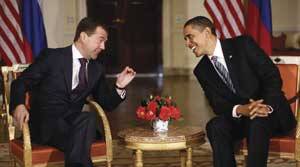President Barack Obama's recent proposal to open a new round of nuclear arms reduction talks with Russia represents the best opportunity in a quarter-century to make meaningful cuts in the world's nuclear weapons stockpiles, according to disarmament advocates. Speaking in Prague on April 5, the president called for a new Strategic Arms Reduction Treaty to replace Start I, which will expire on Dec. 5, 2009.
Mr. Obama said he and Russia's President Dmitri M. Medvedev discussed the subject during the G-20 economic summit in April and that he and Mr. Medvedev agreed to seek a treaty by the end of the year that is "legally binding and sufficiently bold.” According to experts, both sides are eyeing steep reductions in their arsenals, from approximately 6,000 warheads each to perhaps as few as 1,000 warheads each. "It means [Obama] is serious about his goal about eliminating nuclear weapons,” said Ronald E. Powaski, who has written on arms control topics for three decades. "Start is one of the key pillars of the whole international effort to control, first of all, and then eliminate nuclear weapons.”
Longstanding nuclear disarmament proponents, like Pax Christi International and its affiliate, Pax Christi USA, as well as the U.S. Conference of Catholic Bishops, are embracing Mr. Obama's proposal. Bishop Howard J. Hubbard of Albany, N.Y., chairman of the U.S. bishops’ Committee on International Justice and Peace, said the U.S. Catholic bishops welcome Obama's commitment. "The president's initiative announced in Prague is an important first step in his administration and [there is] hope it will move the ball forward. It's not the ultimate goal we would like to see [full nuclear disarmament], but it is a positive step in the right direction.”
David Cortright, a research fellow at the Kroc Institute for International Peace Studies at the University of Notre Dame, said momentum for strong arms control agreements has been building for more than two years. He cited two influential opinion pieces by a bipartisan group of former foreign affairs and defense officials, including George P. Schultz, William Perry, Henry Kissinger and Sam Nunn, that appeared in The Wall Street Journal starting in 2007. The former cold warriors called on the United States to seek significant reductions in strategic arms in partnership with Russia. This type of bipartisan agreement, says Cortright, shows that those who oppose significant nuclear disarmament are a shrinking minority. "I think there's a decent chance that there could be sufficient Republican support” for a new Start, said Cortright, who also is co-chairman of Faithful Security, a pro-disarmament group based in Goshen, Ind.
In addition to nuclear weapons reductions, President Obama has called for limits on the production of nuclear weapons-grade chemicals and other materials and for the development of stringent steps to prevent nuclear materials from being traded on the global black market, policies he proposes to implement within four years. To assist emerging countries, Mr. Obama has called for the creation of an international atomic fuel bank that would allow nations to develop nuclear power for civilian uses without increasing the risks of nuclear weapons proliferation.
As the expected negotiations unfold this year, Marie Dennis, co-president of Pax Christi International, said it would be the work of grass-roots organizations to build the political will across the country so that the U.S. Senate will quickly ratify any arms control treaty once it is signed by both nations. In the same vein, Bishop Hubbard expressed his hope that the U.S. bishops will promote programs stressing the church's position on nuclear disarmament. "We're encouraging bishops within their dioceses to make known the bishops’ teaching on nuclear war and to help people understand the importance of what the president is proposing,” he said.








